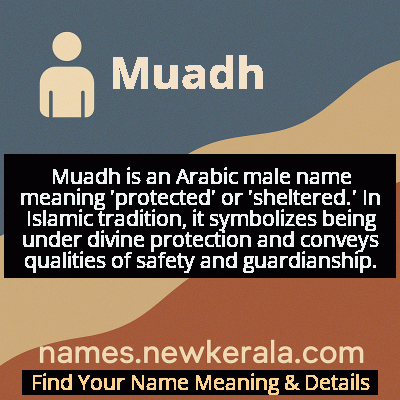Muadh Name Meaning & Details
Origin, Popularity, Numerology Analysis & Name Meaning of Muadh
Discover the origin, meaning, and cultural significance of the name MUADH. Delve into its historical roots and explore the lasting impact it has had on communities and traditions.
Name
Muadh
Gender
Male
Origin
Muslim
Lucky Number
2
Meaning of the Name - Muadh
Muadh is an Arabic male name meaning 'protected' or 'sheltered.' In Islamic tradition, it symbolizes being under divine protection and conveys qualities of safety and guardianship.
Muadh - Complete Numerology Analysis
Your Numerology Number
Based on Pythagorean Numerology System
Ruling Planet
Moon
Positive Nature
Diplomatic, friendly, artistic, empathetic.
Negative Traits
Over-sensitive, moody, indecisive, prone to self-pity.
Lucky Colours
Green, cream, white.
Lucky Days
Monday.
Lucky Stones
Pearl, moonstone.
Harmony Numbers
1, 3, 4.
Best Suited Professions
Diplomats, mediators, caregivers, artists.
What People Like About You
Cooperative spirit, friendliness, artistic talent.
Famous People Named Muadh
Muadh ibn Jabal
Companion of Prophet Muhammad
Foremost scholar of Quran and Islamic law, sent to teach Islam in Yemen
Muadh al-Khasawneh
Jordanian politician
Former Prime Minister of Jordan and prominent legal scholar
Muadh Afifi
Egyptian footballer
Professional footballer in Egyptian Premier League
Muadh Al-Muaalimi
Saudi academic
Renowned educator and former university president
Name Variations & International Equivalents
Click on blue names to explore their detailed meanings. Gray names with will be available soon.
Cultural & Historical Significance
The name's meaning of 'protected' also resonates deeply in Islamic theology, reflecting the belief in Allah's divine protection over believers. Throughout Islamic history, the name has been associated with wisdom, leadership, and religious devotion, making it a popular choice for families seeking to instill these values in their sons. The cultural significance extends beyond religious contexts, as the name represents ideals of protection, knowledge, and moral integrity that are valued across Muslim societies.
Extended Personality Analysis
Individuals named Muadh are often perceived as protective, responsible, and deeply principled. They tend to exhibit strong leadership qualities combined with a nurturing nature, reflecting the name's meaning of being a protector. Their personality is typically characterized by wisdom beyond their years, analytical thinking, and a calm demeanor that inspires trust in others.
Muadh's are often seen as reliable anchors in their social circles—people who others turn to for guidance and support during difficult times. They possess a natural inclination toward learning and knowledge-seeking, often excelling in academic or religious studies. While they may appear reserved initially, they demonstrate fierce loyalty to those they care about and will go to great lengths to protect their loved ones and principles. This combination of intellectual depth and protective instinct makes them natural leaders and trusted advisors.
Modern Usage & Popularity
In contemporary times, Muadh remains a popular name in Muslim communities worldwide, particularly in Arab countries, Southeast Asia, and among Muslim diaspora communities in Western nations. The name has maintained consistent popularity due to its strong Islamic heritage and positive meaning. While not among the most common Muslim names, it enjoys steady usage among families who value traditional Islamic names with historical significance. In recent years, there has been a slight increase in its popularity as younger Muslim parents seek names that are both traditional and distinctive. The name is particularly favored by educated, religious families who appreciate its association with knowledge and protection, and it continues to be chosen by parents who wish to honor Islamic tradition while giving their son a name with deep spiritual meaning.
Symbolic & Spiritual Meanings
Symbolically, Muadh represents the concept of divine protection and spiritual shelter. It embodies the idea of being safeguarded not just physically but also morally and spiritually from harm and corruption. The name carries connotations of being a fortress—both as someone who provides protection to others and as someone who is themselves protected by faith and principle. In a broader sense, it symbolizes the Islamic ideal of seeking refuge in Allah's protection while also serving as a protector of one's family, community, and values. The name suggests a person who stands as a barrier against wrongdoing and who maintains integrity in the face of challenges, representing the balance between receiving divine grace and actively upholding moral responsibilities.

